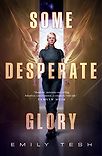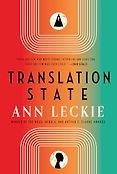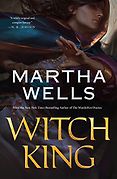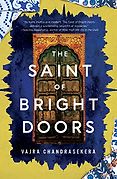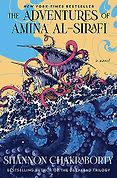Before we dive into the books, could you introduce us to the Hugo Award?
The Hugo Award has been a fixture for speculative fiction since 1953. To be eligible for the ‘novel’ category, a work has to be more than 40,000 words: there are also awards for novellas, novelettes, short stories, graphic novels and fanzines. In the world of speculative fiction, these are all important and popular categories, and authors will often write in more than one form. Last year’s winner in the best novel category, T. Kingfisher, won the award for best novella this year with Thornhedge.
Three novels on the Hugo list were also nominated for the Nebula award this year – another prestigious prize for science fiction and fantasy books. Shall we start with those? First there’s Translation State, by Anne Leckie.
Yes. As well as getting nominated for both lists, Leckie won the ‘best series’ Hugo for the Imperial Radch trilogy – and Translation State takes place in the same universe. So she has received a lot of well-deserved accolades here.
You can tell, as you read Translation State, that you’re in a richly developed universe. There’s subtly drawn political intrigue between multiple groups, not easily reducible to the good and the bad. There are social complexities too, notably the highly developed pronoun vocabulary required to cover the gender concepts of the different species and societies. This latest book reflects the outcomes of political decisions made in the trilogy, so the world has a sense of history too.
A lot to dive in to! Can you begin with Translation State, or do you need to read the trilogy first?
Translation State is totally self-contained. You are following three stories, which gradually become one – a diplomat investigating a fugitive, an ‘every man’ character of importantly-uncertain heritage, and a truly alien character who is being raised in a strange colony of even-stranger children, all destined for ‘matching’. What is matching? Why do these children eat each other, and why does no one seem to mind? Leckie reveals information at a masterfully controlled pace, keeping the reader curious.
It’s this curiosity, and mortal fear for the characters, that keep the pages turning. But Leckie is the rare author that can spin a page-turning plot and build a truly interesting world. Two characters wish to declare themselves legally human, and must explore what it means; untranslatable cultural differences abound; readers are confronted with the idea of merging minds to form new identities. There’s lots to think about.
Translation State is sci fi; the other two books to feature on both the Hugo and the Nebula list are fantasy. Tell us about Witch King, by Martha Wells.
It’s exciting to see this fantasy from Wells, who is most famous for her sci fi series Murderbot. In fact, Wells declined a Nebula nomination for that series this year – for the second time – because it has already received so many accolades.
This is another rich world, but it’s carefully underexplained. The effect is evocatively murky – quite literally sometimes, with dark scenes underwater and one in the ominous underearth. We are following a demon who is embodied in the human world now, but has origins in the underearth; he is pitted against Hierarchs, who use the magic of expositors; witches are present, on the side of the heroes; and the Immortal Blessed are a powerful and morally divided group. Magic is fuelled by pain, inflicted on the self or others. This makes for some chilling scenes.
This is a high-stakes story then?
Yes, it concerns high politics, and there’s plenty of mortal peril for the characters. You are following two timelines at once – a past resistance, and now a plot against the still-young regime that the resistance birthed. The book is serious about the long, slow work of political change – when one character wants to burn the world, they are told, “Unfortunately, someone else has already burned it. We need to unburn it.”
The next nominee has already won the 2024 Nebula Award: tell us about The Saint of Bright Doors, by Vajra Chandrasekera.
I really loved this book! It is the rare fantasy world that feels completely real, and at the same time strange and sublime in places. It put me in mind of Diana Wynne Jones, although she writes primarily for children; Chandrasekera has the same light touch, whereby high magical stakes can feel somehow secondary to your delight in exploring the world – a high stakes story that reads like a low fantasy, in the best possible way.
We are following Fetter, the child of a god-like figure called ‘The Perfect and Kind.’ The Perfect and Kind abandoned both Fetter and his mother. The mother wants Fetter to assassinate his father; Fetter wants to live a normal life in the nearest big city, attend his support group for the unchosen children of powerful parents, and forget about it all. This is, of course, impossible.
“The Hugo Award has been a fixture for speculative fiction since 1953”
The city of Luriat feels South Asian – Chandrasekera is Sri Lankan – and entirely convincing. The magic woven throughout is beautifully strange. Fetter can see devils of all sorts that other people don’t, clinging to the sides of buildings or shuffling horribly down streets. His father’s Saints have powers of their own – one spends days surveilling the city from the skies, pacing in strange patterns overhead. And of course there are the bright doors: doors that were left closed too long, and now won’t open again. In Luriat, all doors are required to have openings or windows, to prevent them turning into bright doors.
For all its strangeness, it’s a convincing medium-sized, cosmopolitan city.
Yes! Things don’t really enter the realm of the surreal until Fetter goes to prison. Here, he walks and walks: you first realise that the prison seems to be a sort of city in itself, then slowly gain the impression that it is more than this, somewhere slightly beyond the normal rules of space and time. From this point on, the magic is more impressionistic and strange. Chandrasekera has led us masterfully to this point, so that we are ready for the more dream-like passages.
There’s one more epic fantasy on the list: The Adventures of Amina Al-Sirafi, by Shannon Chakraborty.
This one is so much fun! Al-Sirafi lived a swashbuckling life as a pirate, but since she became a mother, she has tried to live safely and quietly. She is convincingly drawn out for one last job, first by rewards, then – as things get more dangerous – by threats. So an adventure on the high seas ensues – and it’s a rollickingly good time.
More specifically, we’re on the Indian Ocean, in the 1200s. You can tell a lot of research has gone into this – both into the politics of the region, and the legends which infuse the story. We’re essentially in our own world – the existence of non-human entities is taken for granted by the characters, but their appearance is alarming, and not experienced by regular landlubbers who don’t meddle. But Al-Sirafi can’t stop running into them. Sometimes she’s fighting them; sometimes she’s receiving magical aid from them; sometimes she’s ill-advisedly marrying them.
So it’s firmly in the tradition of sailor’s tales, then…
Yes, it has the convincing ring of a sea-going epic, with all the set-piece encounters along the way. And each one is really distinctive and exciting. There’s a loveable crew too, and the sad feeling of farewell when the story’s over and you have to leave them behind. The ending sets us up for more Al-Sirafi adventures, and I hope they’re coming.
The next nominee brings us back to the modern day: tell us about Starter Villain, by John Scalzi.
This novel is pure entertainment, very skilfully executed. Charlie Fitzer inherits his deceased uncle’s business, which is – although the optics of the word is not always ideal – villainy. The FBI are almost immediately after him, so he relocates to the volcano island lair (which exists for purely practical reasons). He is soon swept up in managing a labour dispute with the dolphins, but the real problem lies beyond his island’s borders: the other villains. His uncle was not popular, and now, neither is Charlie.
Oh, and his pet cat turns out to be part of an intelligent cat spy network.
While laying this groundwork, Scalzi pokes plenty of fun at the tropes of villainy, wryly exploring the practicalities of really making it work as a business. Then the thriller gets underway, as negotiations between the villains begin, and we are caught up in the urgent need to understand who is double-crossing who. Lives are at stake. And everyone has zippy one-liners.
This is very tight writing. The denouement makes satisfying use of apparently-trivial earlier details, and keeps you guessing until the very last reveal.
Scalzi was nominated for last year’s Hugo as well, wasn’t he?
Yes! With The Kaiju Preservation Society. A very similar vibe – if you enjoyed one, you’ll like the other. I think Starter Villain is my favourite of the two.
And finally, introduce us to the winner – Some Desperate Glory, by Emily Tesh. Why is it the best speculative novel of 2024?
Some Desperate Glory starts as a convincing, straightforward yarn about an outpost of human survivors on a space station, Gaea. Earth has been destroyed by an all-knowing benevolent AI, the Wisdom, and the humans left behind are righteously angry. No-one is more committed to their vengeful cause than our hero, Valkyr. But almost immediately, you see the cracks that she is blind to: this regime seems despotic and manipulative, and their cause and methods questionable. We join the story just as Valkyr is about to have her faith tested.
This section of the book rattles along apace, but you may be surprised to arrive at what feels like the denouement with a hefty chunk of the book still to go. That’s because this is only the first denouement. The Wisdom hasn’t shown Valkyr everything it can do yet. Alternate universes are about to come into play.
There is nothing complex about these universe-resets, but the result is satisfyingly twisty and rich, as characters with different sets of memories encounter each other in different timelines, and we see how different versions of reality shape their distinctive personalities. This makes for a compelling and moving character arc for Valkyr, as she adjusts her understanding of the people she thought she knew, of herself, and of her idea of victory. She is surrounded by characters we care about, and want to see in each new setting, which makes for a compulsive page turner.
The mechanisms are not startlingly new, but the execution is excellent: thoughtful and thoroughly entertaining. The Chicago Review of Books said that “it’s hard to overstate how good this novel is at what it’s doing. Some Desperate Glory takes tried-and-true material and elevates it remarkably.”
August 20, 2024. Updated: December 2, 2024
Five Books aims to keep its book recommendations and interviews up to date. If you are the interviewee and would like to update your choice of books (or even just what you say about them) please email us at [email protected]
Five Books interviews are expensive to produce. If you've enjoyed this interview, please support us by donating a small amount.

